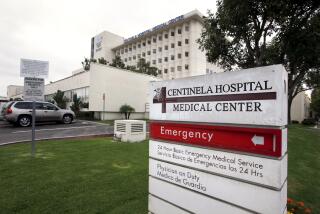Put Light on Medical Errors
- Share via
Jesica Santillan, a sunny 17-year-old who died Feb. 22 after undergoing a botched heart-lung transplant at Duke University Medical Center in Durham, N.C., is only one of several patients who recently made the news after medical professionals failed to take the most basic precaution of making sure the organ donor and the recipient had compatible blood types.
Last week, the parents of Jeanella Aranda, a 1-year-old who died in a Dallas hospital last August, filed a lawsuit detailing how a series of surgical errors, including transplanting a liver with the wrong blood type, allegedly led to their daughter’s death.
Medical errors prove fatal to as many as 98,000 patients in U.S. hospitals each year, according to a 1999 federal study. Communication failures of the sort that doomed Jesica and Jeanella are all too common in medicine. As Dr. Carolyn M. Clancy, the new director of the federal Agency for Healthcare Research and Quality, puts it, “There’s more double-checking and systematic avoidance of mistakes at Starbucks than at most health-care institutions.”
Public reporting and analysis are the first step in figuring out how to reduce medical errors. Last week, the House of Representatives voted 418 to 6 to create a system for doctors and hospitals to voluntarily and in confidence report errors to a federal clearinghouse that would analyze the reports and distill lessons for health workers.
The measure, HR 663, is weak. The Senate, which considers it next, should beef up its funding, make the error reporting closer to mandatory and get rid of restrictions that would make it harder than it is now for patients to get information on medical errors from hospitals.
That the bill exists at all is due to another piece of legislation that would cap pain-and-suffering damages for medical errors at $250,000, a fraction of what it ought to be to balance fairness to doctors with justice for victims of error. The medical error legislation was billed as a protection to patients in return. It might eventually reduce medical errors but would offer nothing to patients who suffer now from such mistakes. It also would not help weed out the most error-prone doctors. The measure goes to the Senate, where Majority Leader Bill Frist (R-Tenn.), a heart surgeon, ought to do better by his profession.
Everyone agrees that what doctors include in their reports to the new patient safety organizations should be kept confidential. HR 663, however, would shield not just the doctor’s report of an error but other error-related hospital documents that, in some states, may now be disclosed.
Only 30% of patients harmed by a medical error were told of the problem by the professional responsible for the mistake, according to a national survey published last year in the New England Journal of Medicine. If the government slashes doctors’ liability, Frist should help right the balance for patients.






